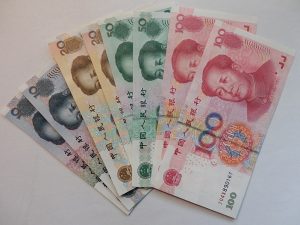Alarming Yuan Devaluation Good for Importers, Bad for Exporters

Creative Commons image by Alexmar983
It has been a crazy couple of weeks for the global economy.
First, the world was astounded by a sudden devaluation of China’s yuan against the U.S. dollar on August 11th. Then came “Black Monday” on August 24th when the Chinese stock market imploded, sending shock waves through global markets. Now, China seems back to artificially propping up the Yuan.
What does it all mean?
Not surprisingly, the world’s financial experts don’t agree.
Many people are calling out catastrophe. And it’s not hard to see why. If this is really a sign that China’s economy is much weaker than it appears, that is not good news for the U.S. After all, the U.S. economy, as well as many others, has become inextricably woven with the Chinese economy.
It’s almost impossible for China’s market crash not to bring to mind the 1929 stock market crash on Wall Street. “Black Monday” is a nickname to make sure many compare the two stock market crashes, as “Black Tuesday” was a nickname from the 1929 crash. There was even a Chinese man who leapt to his death from a tall business building over China’s market crash, paralleling the U.S. businessmen who chose the same means of suicide after the 1929 crash on Wall Street.
These parallels have some thinking we are being launched into worldwide economic depression like the Great Depression. Don’t panic. Many economic experts vehemently disagree.Since the money and economy experts can’t agree on what all the drama with the yuan really means, we won’t try to solve it here. We will, however, get into how the strength of the yuan affects international shippers.
There are two classifications of shippers: importers and exporters. Yes, many are both importers and exporters, but that’s not important for the purposes of this blog. The value of China’s yuan has opposite effects on importers and exporters.Here’s how:
Big Yuan Devaluation Good for U.S. Importers
The big drop in the yuan’s value versus the value of the U.S. dollar on August 11th could actually be a very good thing for U.S. shippers who import from China. As an exporter in China, it could be beneficial as well.
Yuan devaluation means less expensive goods from China. That whole “made in China” label you see all over goods on store shelves just became more profitable for retailers.
Less expensive goods means more potential profit for businesses. The yuan devaluation creates opportunity for importers to make more money shipping from China. Because of that, it also creates a potential boost for Chinese exporters.
Big Yuan Devaluation Bad for Exporters
For shippers who are exporting goods to China, the yuan devaluation is bad.
China has been shifting to more consumerism, which is a very good thing for U.S. shippers exporting to China. However, the yuan dropping in value against the dollar puts a damper on the good times consumerism.
A depreciating yuan means less spending power for Chinese consumers when it comes to buying “Made in America” products. This negatively affects U.S. exports to China and Chinese importers who buy and sell American made products.
What the Yuan is Going On?
Importers shouldn’t get too excited about the devaluation of the yuan nor should exporters get too downhearted.
China has gone back to work propping up the value of the yuan. Reuters reported today (August 27th) about the yuan’s value already increasing again against the dollar:
China’s yuan closed firmer against the dollar on Thursday as traders cited large transactions by state-owned banks possibly on behalf of the central bank, which supported the Chinese currency in both spot and derivative markets.
“Major state banks did some large deals, supporting the yuan’s value,” said a dealer at a European bank in Shanghai. “While we cannot be 100 percent sure, such large transactions are typically conducted on behalf of the central bank.”
This does not move the yuan’s value against the dollar to higher levels than before August 11th, and the yuan does seem to still be facing downward pressure.
It is expensive to prop up a currency, so importers should keep their eyes open for opportunities to capitalize on yuan drops.
![]()
Source: China


